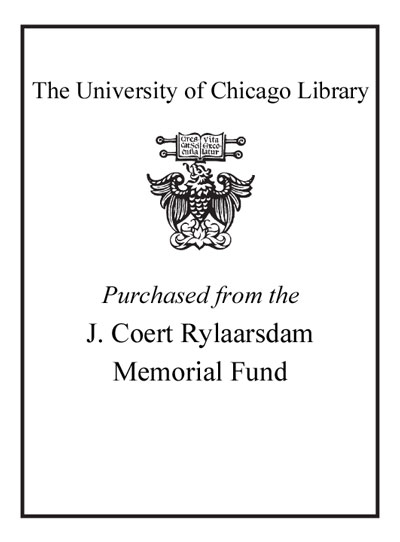The so-called Deuteronomistic history : a sociological, historical and literary introduction /
Saved in:
| Author / Creator: | Römer, Thomas, 1955- |
|---|---|
| Imprint: | London ; New York : T & T Clark, c2005. |
| Description: | x, 202 p. ; 24 cm. |
| Language: | English |
| Subject: | |
| Format: | Print Book |
| URL for this record: | http://pi.lib.uchicago.edu/1001/cat/bib/5902435 |
Table of Contents:
- List of abbreviations
- Introduction
- Chapter 1. The Content of the So-called Deutronomistic History (Deuteronomy-2 Kings)
- 1. Deuteronomy
- 2. Joshua
- 3. Judges
- 4. Samuel-Kings
- Chapter 2. What Does 'Deuteronomistic History' Mean? A Survey of Past Research
- 1. The Prehistory of the Deuteronomistic History Hypothesis
- 1.1. The First Steps towards the Idea of a 'Deuteronomistic History'
- 1.2. The Discovery of 'Deuteronomism'
- 1.3. The Elaboration of the Idea of Deuteronomic Editors
- 2. The Elaboration of the Deuteronomistic History Hypothesis by M. Noth
- 2.1. The Origins of Noth's Thesis
- 2.2. The Uberlieferungsgeschichtliche Studien
- 2.3. First Reactions to Noth's Model
- 3. Major Modifications and Criticisms of the Deuteronomistic History Hypothesis
- 3.1. Frank Moore Cross and the Double Redaction of the Deuteronomistic History
- 3.2. Rudolf Smend and the Multiple Exilic Redactions of the Deuteronomistic History
- 3.3. The 'Neo-Nothians'
- 3.4. The Deuteronomistic History and Other Deuteronomistic Redactions
- 3.5. Recent Criticisms of the Deuteronomistic History Hypothesis
- 3.5.1. Deuteronomistic History and Historiography
- 3.5.2. Do the Books from Deuteronomy to Kings Reveal a Coherent Deuteronomistic Redaction?
- 4. The Present State of Discussion: A Time for Compromise?
- Chapter 3. The Deuteronomistic History from the Assyrian to the Persian Period
- 1. Who Were the 'Deuteronomists'?
- 2. The Foundation Myth of the Deuteronomistic School in 2 Kgs 22-23: Book-finding and Cultic Reform
- 3. The Three Different Viewpoints about Centralization in Deut. 12 as an Example of the Threefold Edition of the Deuteronomistic History
- 3.1. Deut. 12.13-18: Practical Consequences of the Centralization at the End of the Seventh Century BCE
- 3.2. Deut. 12.8-12: An Exilic Reinterpretation of the Concept of Centralization
- 3.3. Deut. 12.2-7: Cult Centralization and the Rejection of 'Illegitimate' Cults in the Persian Period
- 3.4. The Three Editions of Deut. 12 and Scribal Activity in the Deuteronomistic History
- Chapter 4. Deuteronomistic Editing in the Assyrian Period and Royal Propaganda
- 1. The Beginning of Deuteronomistic Literary Production in the Seventh Century BCE
- 2. The First Edition of Deuteronomy in the Assyrian Period
- 2.1. Deuteronomy and Assyrian Treaty Literature
- 2.2. Content, Concerns and Ideology of the First Edition of Deuteronomy
- 3. Political and Military Propaganda in the Book of Joshua
- 3.1. The Problem of Composition in Joshua
- 3.2. Neo-Assyrian Conquest Accounts and their Significance for the First Edition of Joshua
- 3.3. The Function of the First Conquest Account in Josiah's Time (Josh. 5-12*)
- 4. Judges, Samuel and Kings
- 4.1. The Book of Judges
- 4.2. The Books of Samuel
- 4.3. The Books of Kings
- 5. Summary: The Origins of the Deuteronomistic Library in the Neo-Assyrian Period
- Chapter 5. The Constitution of the Deuteronomistic History in the Neo-Babylonian Period
- 1. Setting the So-called 'Exilic Period'
- 1.1. From Josiah to Exile
- 1.2. The Invention of the 'Exilic Period'
- 1.3. The Concept of Crisis Literature
- 2. The Structure and Ideology of the Deuteronomistic History's Exilic Edition
- 3. The Exilic Edition of the Deuteronomistic History
- 3.1. The Book of Deuteronomy: The Reader's Guide to the History
- 3.1.1. The Literary Fiction of Deuteronomy
- 3.1.2. The Construction of Israel's Origins in Deut. 1-3
- 3.1.3. The References to the 'Fathers' and the Exodic Origin Myth
- 3.1.4. Deut. 5 and the Organization of the Law
- 3.2. From the Conquest of the Land to the Conquest of the Law: Reinterpreting Joshua
- 3.3. The Invention of a Period of Judges (Judg. 2.6ff-1 Sam. 12*)
- 3.3.1. The Deuteronomistic Editing of Judges
- 3.3.2. The Deuteronomistic Attitude to Monarchy (Deut. 17.14-20 and 1 Sam. 8-12)
- 3.3.3. The Ark Narrative in 1 Sam. 4-6 (and 2 Sam. 6)
- 3.4. The Foundation of the Dynasty and the Foundation of the Temple (1 Sam. 12-1 Kgs 8)
- 3.5. The Story of the Two Kingdoms (1 Kgs 9-2 Kgs 17)
- 3.5.1. Solomon and the Crisis of Monarchy
- 3.5.2. Prophets and Kings
- 3.5.3. The Northern Kings
- 3.5.4. The Southern Kings (from Rehoboam to Ahaz)
- 3.6. Cultic Reforms and the End of Judah (2 Kgs 18-25)
- 4. Summary: The Exilic Edition of the Deuteronomistic History
- Chapter 6. Editing the Deuteronomistic History During the Persian Period
- 1. Social and Political Context in Judah during the Persian Period
- 2. The Main Themes of the Persian Edition of the Deuteronomistic History
- 2.1. Segregational Revision in Deuteronomy to Judges
- 2.2. From Monolatry to Monotheism
- 2.3. Golah and Diaspora
- 3. The Death of the Deuteronomistic History and the Birth of the Torah
- Index of Passages Cited
- Index of Authors

